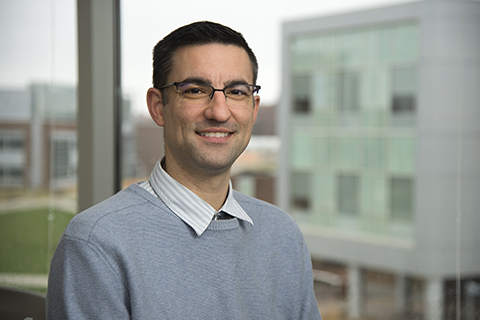January 26, 2016
Purdue Profiles: David Nelson
 |
|
David Nelson, associate director of the Center for Instructional Excellence, is an integral part of the IMPACT (Instruction Matters: Purdue Academic Course Transformation) program, which helps faculty, staff and graduate students find new and engaging ways of teaching. (Purdue University file photo/Mark Simons) |
Before David Nelson came to work for Purdue as the associate director of the Center for Instructional Excellence, he was on course to become a historian specializing in French colonial history. Instead, he chose to take the passion for teaching he acquired as a graduate assistant and put it to work changing the way professors around the world teach their students.
Nelson did his undergraduate work at the University of Arizona and received his doctorate from the University of California-Irvine. He has been at Purdue for seven years and is an integral part of the IMPACT (Instruction Matters: Purdue Academic Course Transformation) program, which helps faculty, staff and graduate students find new and engaging ways of teaching.
What drew your attention away from history and into education?
I really enjoyed the work I was doing as a historian, but I pretty much had to do it by myself. I had to do writing and research alone. The type of research I was doing was in French colonial history and that was going to require me to spend summers in North Africa, Vietnam and the Caribbean, and be away from family and from friends. I thought that I could have more of a contribution by working with a wider group of people. I realized I needed to work with people on a regular basis, and the life of an academic can be one of much solitary work.
What is your job here with the CIE?
My broader campus job is to serve as a resource to anyone that is working on teaching and learning. There are a lot of staff that teach courses and, if they have any questions or they want input, we serve as a resource broker. Instead of everybody having to be an expert in their discipline and an expert in teaching, we try to aggregate a lot of that expertise.
What is your role with IMPACT?
I was part of the initial group that was bringing it together and started with the first cohort in the summer of 2011. We put faculty participating in the program through a 13-week course, and I have several sessions where I am the lead facilitator. I also have worked as a direct consultant on some of the teams, including the management, research and support teams. The research team in particular is dedicated to researching all of this change. There have been more than 200 classes with tens of thousands of students going through them and we needed to know what's the impact, what's the effect of all of this work?
What do you see in the future for IMPACT?
Right now, it’s a 13-week course that is fairly involved. We are talking 3-4 hours a week. That is a lot of time. Time is by far the most precious resource to faculty. We thought about how we could offer some of the elements of IMPACT, and thinking about a redesign, to people that may not have that time investment.
We are on track to reach our goal of 300 IMPACT courses by the end of the 2017 academic year. When that initial target is met, the hope is to have faculty new to Purdue go through something like this at some point in their career. We want to try to find a way to take the resources we have and make it accessible to a larger amount of faculty on campus. We also are starting to export IMPACT to other places. We have had international visitors come to Purdue just to see this. We have had visitors from Denmark, Ireland and all over the world.
What is your favorite part of your job?
I don’t have just one part. I love all of it. I come to work and work hard and on weekends, but it's not labor. I get to work with people every day. I get to work with people who care, and it is different all the time. You have conversations with somebody and they want to try something different in the classroom. You get to help them think about it in slightly a different way. They get excited about that and come back to you say, "Oh, by the way, this worked." It is strictly taking the best that people have already, the amazing things that they are doing, and maximizing them.
Writer: Megan Huckaby, 765-496-1325, mhuckaby@purdue.edu

